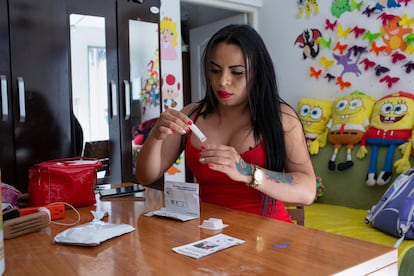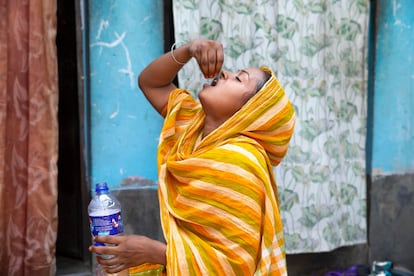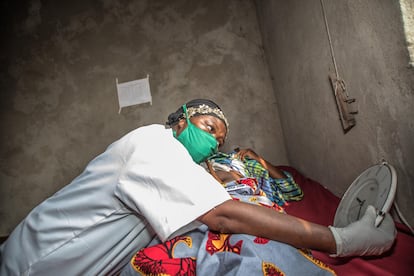Covid-19 deals historic blow to the fight against HIV, tuberculosis and malaria in 2020
Diagnostic tests and treatments either fell or stalled worldwide, according to a devastating report from the Global Fund. It is the first such setback in 20 years of investment

The Covid-19 pandemic derailed the global response against tuberculosis (TB) and HIV and halted progress against malaria in 2020 compared to 2019, according to the Global Fund’s annual report. For the first time in its 20 years of existence, the world’s largest multilateral financier of prevention, treatment, and care programs for these illnesses has recorded serious setbacks in the poorly resourced countries in which it operates, above all in the testing capacity for and treatment of tuberculosis and the diagnosis and prevention of HIV.
“These figures are stark confirmation of our premonitions when the Covid-19 pandemic began,” says the executive director of the organization, Peter Sands. “Covid-19 is the greatest obstacle in the fight against HIV, TB and malaria that we have encountered since the creation of the Global Fund, exacerbating existing inequalities, diverting vital resources, halting or reducing access to treatments and preventive measures and increasing risk among vulnerable people.”
According to the Global Fund report, the number of people who received treatments for tuberculosis fell by a million in 2020 over a year earlier. Treatment for cases resistant to medication was reduced by 19% and in ultra-resistant cases the decrease was 37%. The impact of these statistics, which the organization has described as catastrophic, could yet multiply taking into account that every TB patient cold potentially infect a further 15 people per year. Until the Covid-19 pandemic gripped the world, tuberculosis was the most lethal infectious disease globally, claiming 1.4 million lives in 2019, and it remains the main cause of death among HIV sufferers.

With regard to HIV, diagnostic tests fell by 22% over the same timeframe and preventive programs reached 11% fewer people than in 2019. “After so many years of hard-won gains, it would be tragic to witness another spike in HIV cases,” says Sands. Forty years after the disease was first identified there are an estimated 4.1 million people in the world who are unaware they are living with HIV and a further 6.1 million who have been diagnosed but are unable to receive treatment.
The response against malaria proved more resilient, although evidence of suspected cases fell by 4.3% and advances against the disease were completely stalled.
The Global Fund report offers several explanations. In many countries, the spread of the coronavirus collapsed health systems, quarantines interrupted the provision of services and supply chains and many existing resources were redeployed to combat the new pandemic. In addition to these factors can be added a reluctance to attend health centers for fear of being infected with Covid-19 or of being stigmatized for displaying symptoms such as coughing or fever, which can also be attributed to malaria and tuberculosis cases.
Speaking to EL PAÍS, Françoise Vanni, head of the Global Fund’s External Relations and Communications Division, says: “The results are serious because the three epidemics are formidable adversaries: if we ease off on prevention, cases increase and that can also lead to more deaths, leaving us in a vicious circle that will cancel out all of the progress made to date.”

In spite of everything, the Covid-19 pandemic has led to some genuine improvements in the fight against the three diseases – improvements which, according to Vanni, need to be consolidated and deployed large-scale. For example, there are no more patients who receive enough HIV and TB medication for several months, meaning they no longer have to go a health center every week and making it easier for them to follow the prescribed treatment. Furthermore, digital tools and messaging are being ramped up in several countries to track TB treatment and strengthen preventive measures against HIV. Efforts are also being made by healthcare workers to run diagnostic tests for HIV, TB and Covid-19 in a single visit.
In Nigeria, for example, the strategy of testing for HIV at the same time people are taking Covid-19 tests has given rise to the diagnoses of cases that under different methods would have passed unnoticed. In the case of malaria, prevention programs have evolved from distributing mosquito nets in town squares and neighborhood meeting points to doing so door-to-door, leading to a record number of people receiving them. Thanks to adaptive measures such as this, there was a 17% increase in mosquito net distribution in 2020.
The response to the Covid-19 pandemic has also benefited from investments made over the past few decades in tackling other diseases and in healthcare systems as a whole. “It was what had been hoped for, but now it has been demonstrated,” says Vanni, in reference to the numerous countries that have responded to the coronavirus crisis using the same laboratories, disease surveillance systems, community networks, trained healthcare workers and supply chains put in place for the fight against HIV, TB and malaria.
The Global Fund views the immediate future with concern, but also with a sense of confidence in regard to Covid-19 and the ability of the response to the other three epidemics to bounce back. “What gives us hope is that we know what works, but if we do not invest now, the new variants of Covid-19 will beat us to the post,” says Vanni. “The world hasn’t yet fully grasped the extent of the crisis and the magnitude of the resources necessary to meet it head-on to prevent even greater health, social and economic impacts.”
English version by Rob Train.
Tu suscripción se está usando en otro dispositivo
¿Quieres añadir otro usuario a tu suscripción?
Si continúas leyendo en este dispositivo, no se podrá leer en el otro.
FlechaTu suscripción se está usando en otro dispositivo y solo puedes acceder a EL PAÍS desde un dispositivo a la vez.
Si quieres compartir tu cuenta, cambia tu suscripción a la modalidad Premium, así podrás añadir otro usuario. Cada uno accederá con su propia cuenta de email, lo que os permitirá personalizar vuestra experiencia en EL PAÍS.
¿Tienes una suscripción de empresa? Accede aquí para contratar más cuentas.
En el caso de no saber quién está usando tu cuenta, te recomendamos cambiar tu contraseña aquí.
Si decides continuar compartiendo tu cuenta, este mensaje se mostrará en tu dispositivo y en el de la otra persona que está usando tu cuenta de forma indefinida, afectando a tu experiencia de lectura. Puedes consultar aquí los términos y condiciones de la suscripción digital.








































